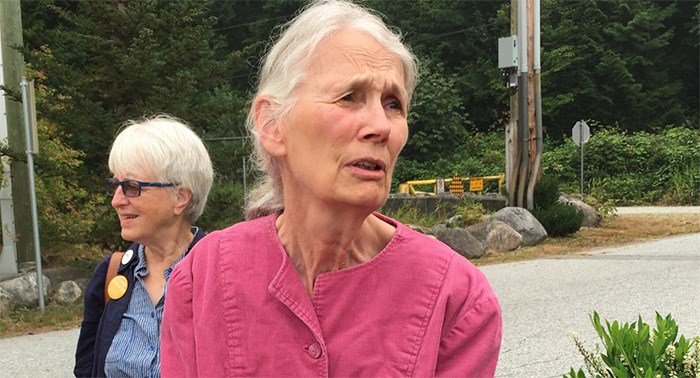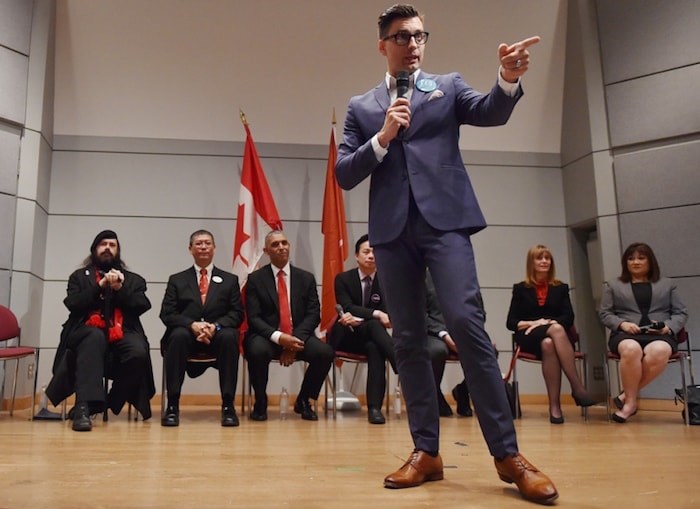Vancouver city councillor Jean Swanson says she’s still planning on donating a sizeable amount of her salary to causes she deems worthy.
Ultimately, she aims to reduce her income to what the average Vancouverite makes — about $44,000 — although she’s not at that point yet.
“I’m a single person. I don't have to have a huge amount of expenses,” said Swanson. “Ninety-one grand should be more than enough.”
 Jean Swanson leaving the clink. Photo COPE
Jean Swanson leaving the clink. Photo COPE
Vancouver city councillors currently make $91,441 per year, which includes a transportation allowance of $5,175. Councillors also receive an annual supplement of $3,048, bringing their total income to $94,489.
Councillors may make more if they hold positions on separate municipal bodies or act as deputy or acting mayor. Swanson is an alternate member at the Metro Vancouver Regional District, a role she said has so far earned her about $1,200.
A longtime anti-poverty activist elected to council under COPE this past October, Swanson originally committed to donate “roughly half” of her councillor salary when she ran in the October 2017 byelection, a race where she ultimately placed second.
In her campaign announcement speech that summer, Swanson said she’d only keep $44,000, what she called the “average Vancouver wage.” According to the 2015 census, the average Vancouver resident makes slightly more than $43,000 in after-tax income, though that amount has likely increased modestly since then.
“I think it’s easier to identify with the issues of people who have average incomes if you’re one of them,” she said at the time. “The rest I would donate to a group, or groups, working for justice.”
Speaking to the Vancouver Courier earlier this month, Swanson said she has been steadily donating a chunk of her salary to various causes she cares about, a decision motivated in part by her views on challenging inequity.
“I think we really need to work for more equality,” she said. “That means raising people from the bottom up. But it also means reducing wealth.”
While Swanson is not quite on pace to donate enough to fulfill her pledge after six months on council, she says she’s still committed to her original goal.
“I'm trying to give away a couple thousand a month, basically,” said Swanson.“I'm going to figure it out over the whole year, rather than month by month, but that's what I'm trying to do.”
Accounting for income tax, Swanson expects to take home about $70,000 this year, excluding what she may earn as an alternate member of Metro Vancouver. This means she would ultimately have to donate about $26,000 of her annual income, or nearly 40 per cent.
Swanson says she’s so far donated approximately $6,985 to several local organizations fighting for social justice, including the Chinatown Concern Group and the B.C. Poverty Reduction Coalition. In the past three months, Swanson has also begun giving her assistant $500 every month to supplement the wage the city pays her. In total, Swanson appears to have donated approximately $8,485 during the first six months of her tenure on council.
The Courier verified roughly 60 per cent of those contributions. The rest could not be confirmed with the respected organizations.
When asked whether Swanson was finding it financially difficult to keep this promise, she laughed.
“It’s actually a little bit more than I had before I got elected,” she said. “Before the election, I was making about $1,600 a month.” According to Swanson, that income came from a mix of pension benefits she receives, much of which will soon be clawed back due to her new salary.
Though relatively uncommon, Swanson is certainly not the first Canadian politician to commit to donating some or all of their political salary.
After voting against a pension increase for herself and her colleagues, the late Margaret Mitchell, a former member of Parliament for Vancouver-East, began putting that additional money into a fund to support initiatives promoting economic and social justice for local women. The Margaret Mitchell Fund for Women continues to this day. Swanson said she actually applied to the fund a few years back on behalf of a non-profit she was involved with at the time.
During his time on Toronto’s city council, Ontario Premier Doug Ford said he donated every year of his salary, as much as $421,588 in total, though Ford never provided evidence of this. And, at the start of his mandate in 2010, Calgary Mayor Naheed Nenshi pledged to donate 10 per cent of what remains one of Canada’s highest mayoral salaries to charity. In 2017, Nenshi said he had continued that practice.
But Terri Evans, an urban studies professor at Simon Fraser University, says elected officials who make these promises rarely provide evidence to show they’ve fulfilled them.
“The challenge with these types of pledges is that quite often it's difficult to know whether there's actually any follow-through with that,” Evans said. “Accountability is often a missing element when such declarations are made.”
 YES Vancouver’s Hector Bremner takes his turn at the all-candidate Vancouver mayoral debate September 17. Photo by Dan Toulgoet
YES Vancouver’s Hector Bremner takes his turn at the all-candidate Vancouver mayoral debate September 17. Photo by Dan Toulgoet
After Swanson pledged to donate part of her salary to local causes back in 2017, Hector Bremner, the NPA candidate who later won the council seat in the byelection, told the Courier he would donate his entire councillor salary to “whatever worthy cause” if elected. Bremner then slightly walked that back after making his debut at city hall: “We’re still trying to figure this all out, but I do plan on trying to make as much of a contribution as possible,” he said at the time.
When the Courier asked Bremner last week if he had fulfilled his original promise, the former councillor said he had, though he was less transparent about his contributions than Swanson.
“My wife and I donated the after-tax amount to issues that matter to us, anonymously, as per our beliefs,” Bremner said via text.
According to the 2018 Statement of Financial Information, Bremner earned $80,101, plus $6,251 in so-called local expenses, which includes the transportation allowance. When he began on council, Bremner was also receiving an income from Pace Group, a public relations firm, for his role as vice president of public affairs. He remained in that position during most of his time as councillor.
“If you can do it, great, if you keep the full salary, that’s great too,” Bremner added. “Just do the work, even when it’s hard, and don’t get into politics for the ‘job.’”
Running under the newly formed Yes Vancouver banner, Bremner came in fifth place in last October’s mayoral election.
According to Evans, Swanson’s promise to donate a part of her salary to bring attention to the average Vancouver income is quite different than Bremner’s pledge.
“She's bringing attention to what is a working-class income in this city and showing how disjointed it is from the kinds of money that the person who is able to speed along the Sea to Sky highway in the $476,000 automobile [makes],” Evans said.
On the other hand, Bremner’s promise to donate his entire salary to charity, effectively waiving what he made as a sitting councillor, appeared to be more rooted in privilege than an effort to shine a light on the city’s growing inequality, Evans says.
“The wealthy have always had representation on council,” she said. “To say to people, 'I'm privileged enough to not be able to draw on this wage,' I think, in some ways, reinforces why someone like Jean Swanson runs for council.”
Still, Evans believes elected officials, who often face demanding, time-consuming responsibilities, should feel no pressure to give up any of their pay. And Swanson says she’s not challenging her colleagues to follow her lead.
“I'm not the kind of person that thinks that elected people should sacrifice and not have a good life and not be able to support their families,” she said. “I'm not expecting people that have families to support to live on the same amount that I am.”
NPA councillor Sarah Kirby-Yung, Green Party councillor Michael Wiebe and OneCity’s Christine Boyle all commended Swanson, but they’re unlikely to do the same, nor do they all have the financial means to do so.
While Kirby-Yung emphasized a councillor’s heavy workload, Boyle stressed the importance of making sure publicly elected officials remain well compensated for another reason.
“When political salaries are too low, only those with existing wealth or financial security can run, and we end up excluding many people, including those with student loans or with dependents,” said Boyle.
“Public office should pay well enough that everyone — regardless of socioeconomic background — can run.”



